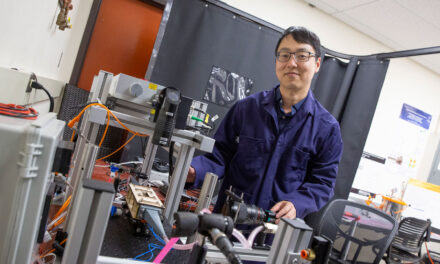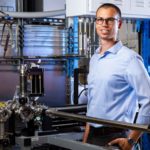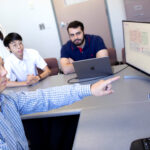
Innovative wireless charging technology drew Sharks to ASU alumni
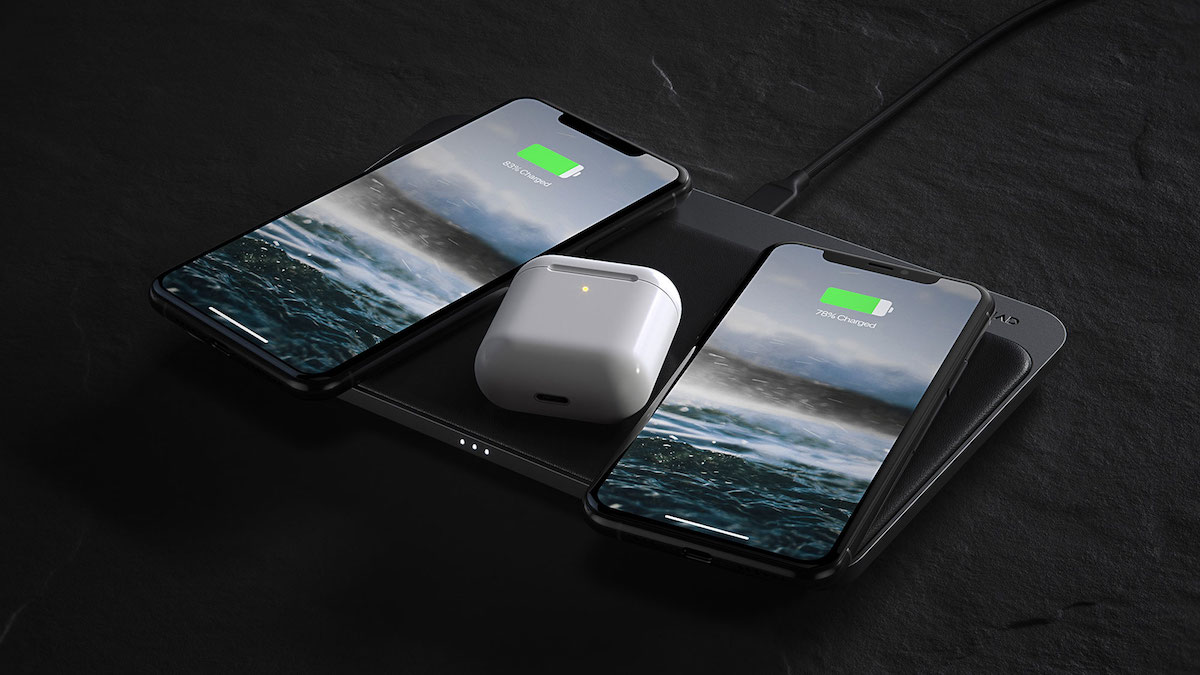
Above: A wireless charging pad by lifestyle phone accessory brand Nomad uses underlying technology developed by Arizona State University alumni Jake Slatnick and Eric Goodchild with their startup venture, Aira. The 2015 Ira A. Fulton Schools of Engineering graduates pitched their technology on an episode of the ABC business reality show Shark Tank this month and earned funding from three investors to expand their engineering team and bring on more licensees. Image courtesy of Nomad
Sharks fought over two Arizona State University alumni — that is, investors from the ABC business reality show Shark Tank competed to get a piece of the former students’ wireless charging technology venture.
Jake Slatnick and Eric Goodchild, who both graduated from Arizona State University’s Ira A. Fulton Schools of Engineering with bachelor’s degrees in 2015, developed what they call FreePower technology over the past two years with their startup Aira.
Their hard work paid off with an impressive showing in a famous arena of entrepreneurial investments.
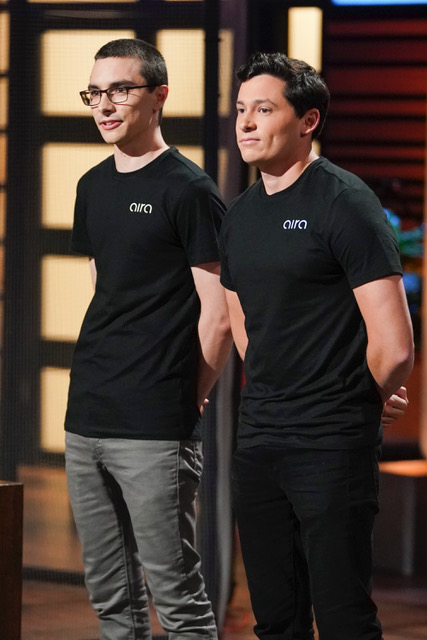
Arizona State University alumni Eric Goodchild (left) and Jake Slatnick (right) pitch their wireless charging technology on the ABC business reality show Shark Tank. Photo courtesy of ABC
Engineering a better charging experience
Slatnick and Goodchild didn’t know each other while they were studying at the same time in The Polytechnic School, one of the six Fulton Schools. But, well before Aira’s era, during one of Slatnicks’ earlier endeavors, when Slatnick wanted to develop a hardware-based company, Goodchild’s name kept coming up.
“At the time I didn’t realize how strong of a fit he was for this particular type of technology [we’d develop with Aira],” Slatnick says. “He’s a great engineer and he’s entrepreneurial and wanted to work hard on something with me.”
The technology builds off Goodchild’s expertise in Tesla coils. Goodchild, who earned his degree in electrical engineering and embedded systems from The Polytechnic School, holds a Guinness World Record for the most powerful bi-polar Tesla coil. [Watch a video of one of Goodchild’s Tesla coil projects.] He has been building Tesla coils since high school and used one of his coils in their Shark Tank pitch.
Nikola Tesla invented an early form of wireless power transmission, and the Tesla coil is a (literally) flashy demonstration of this technology. Today’s smartphones use a similar coil technology to enable wireless charging — separate coils in the transmitter on the charger and the receiver on the device sync up to create a magnetic field that allows electricity to flow.
Aira improves upon existing coil technologies with a new coil matrix topology and algorithms to allow up to three devices to draw wireless power positioned anywhere on the charging surface.
Getting rid of the requirement that the device is perfectly lined up with a central charging “hotspot” is Aira’s game-changing improvement to current wireless charging surface technology. The coil and algorithms in Aira’s FreePower technology work together to find and track a device’s “Sweet Spot” to activate and deliver power to devices. If the devices move, the pad tracks the Sweet Spot to continue charging.
If this sounds familiar, it’s a similar technology to Apple’s never-released AirPower device that aimed to charge various Apple devices in any configuration.
However, unlike AirPower, Aira’s FreePower is device-agnostic. That means utilizing the universal Qi wireless charging protocol, FreePower is compatible with Apple, Samsung, Google, Huawei and all other Qi-enabled devices. So, a user could charge a Samsung Galaxy phone, an iPhone and Apple AirPods all at the same time in any configuration at a 5-watt charging speed.
The 5 W charging speed doesn’t max out the 10 W speed many devices support, but according to Slatnick, that’s not actually much of a limitation at all.
“An interesting detail that we’ve learned through benchmarking is that our 5 W output charge time is comparable to other 10 W advertised chargers,” Slatnick explains. “It turns out, as soon as the phone starts to heat up, the charge speed slows down significantly, usually below 5 W. The 10 W+ chargers seem to only last at those speeds for a few minutes. We think the performance right now is on par with everything else and that it shouldn’t be noticeable to most users.”
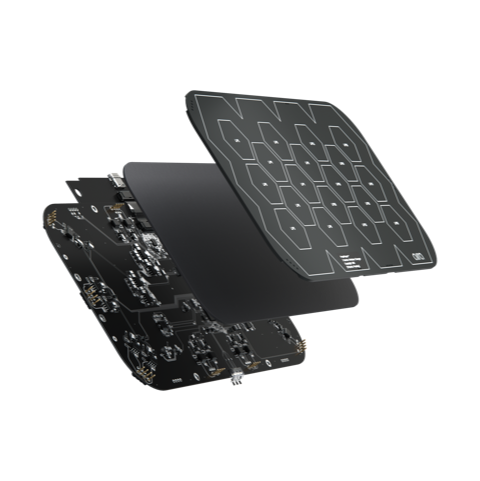
An expanded view of Aira’s FreePower wireless charging technology, which Slatnick and Goodchild are licensing to companies such as Nomad. Image courtesy of Jake Slatnick
With the patented circuitry and proprietary algorithms in place, Aira has moved beyond the startup phase of their venture. That’s where Shark Tank came in — they needed a strategic partner and additional funding to expand their engineering team and bring on more licensees.
Living, learning and succeeding on the entrepreneurial path
Slatnick has always had an entrepreneurial mindset, having started his first company at age 13. When it came to college, he knew as soon as he heard about it that he wanted to pursue the technological entrepreneurship and management program at ASU.
“The idea behind the technological entrepreneurship and management program being in the engineering school is that entrepreneurs can meet engineers and they can form teams to solve problems and build businesses,” Slatnick says.
Because entrepreneurs aren’t always engineers and engineers aren’t always business-minded, he says it makes sense to pair them together.
“This business is almost a proof of that model because myself and another student from The Polytechnic School ended up teaming up, we built a really cool product and we’re making some great market traction,” Slatnick says. “It’s exactly what the original vision for my program was.”
Slatnick was in the first class of the first semester of the technological entrepreneurship and management program, and he took full advantage of all the opportunities the program and campus provided.
“With any major, any education path you take, how much you apply yourself is how much you’re going to get out of it,” Slatnick says. “At the Polytechnic campus, there are so many ways to apply yourself.”
He participated in several pitch events and other entrepreneurial opportunities and launched an entrepreneur speaker series. He also started his own businesses while he was a student and after he graduated. Aira is the fourth business Slatnick has founded or served as CEO.
Putting his entrepreneurial skills and Goodchild’s engineering expertise to use, the two pitched their venture to Shark Tank.
“It’s this famous set for entrepreneurs to share their ideas and their dreams with these famous, outspoken investors,” Slatnick says, recalling the show started around the time he was trying to start his first business. “Growing up it was so cool, and so was having the opportunity to be on the show and do well.”
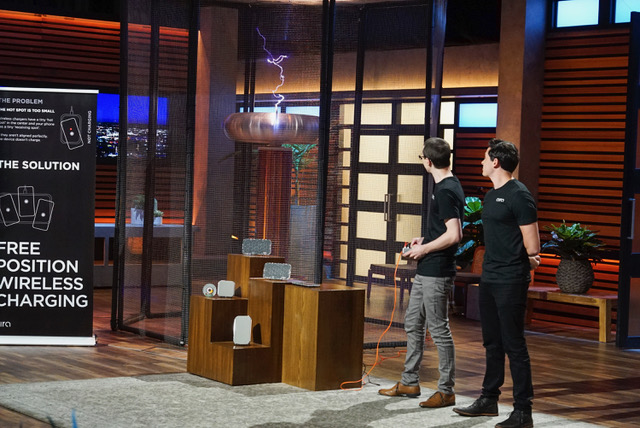
Eric Goodchild powers up a Tesla coil he built to demonstrate the inspiration for Aira’s underlying wireless charging technology during his Shark Tank pitch with co-founder Jake Slatnick. Photo courtesy of ABC
They prepared extensively to create a pitch to generate immediate interest and were ready for any questions the investors might throw at them. After what ended up being nearly an hour-long discussion, the Shark Tank investors were impressed. Soon, two offers materialized.
“My past experience helped a lot [with negotiating], and one of the things you get a sense of is how to calculate how much value something is worth to somebody, and that what you get in negotiations is equivalent to the value you’re offering,” Slatnick says. “On the surface [our counteroffer] seemed like a risky negotiation, but I think it was a pretty safe thing to throw out there because they were all spending less and getting a little more.”
When Slatnick and Goodchild couldn’t decide between the two competing offers after a short, whispered discussion, Slatnick’s knack for negotiating kicked in. He thought, “How cool would it be if we just got all three of them?”
Slatnick made a bold move to get three Sharks on their side: transforming two competing offers into an attractive offer involving all the investors.
“If you’re going in the ‘tank,’ you should be going in there for the strategic partnership,” Slatnick says.
Goodchild and Slatnick left the tank with a $500,000 investment and three influential strategic partners who have a combined 15% stake in Aira.
By the time of their pitch, they had secured a prepaid license order from a company called Nomad, a lifestyle brand of phone cases and a wireless charger. Later in 2019, Nomad will be releasing the Nomad Base Station Pro, which will be the first available product using Aira’s FreePower technology.
Aira has also received an investment from Shawn Dougherty, the founder of Mophie, one of the largest consumer electronic accessory companies in the world. They’re working on more licensing deals with additional accessories, automotive and furniture companies.
Slatnick’s advice to budding entrepreneurs: There’s no recipe for success, just go for it. Every time you succeed, reflect on what was done well. Every time you fail, take it as your most valuable learning experience. Eventually, you’ll figure out your own unique path.
Watch Jake Slatnick and Eric Goodchild pitch Aira’s technology on Shark Tank season 11, episode 3 on ABC.



